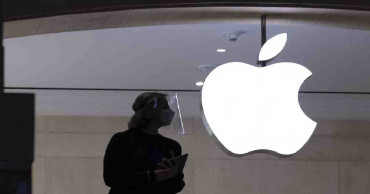Tim Cook
Apple CEO celebrates India as first store in country set to open on April 18
As it celebrates more than 25 years in India, iPhone manufacturer Apple announced today that its first two stores in the country will open this week, marking the company's ambitious growth strategy.
Apple will open two locations in Mumbai and Delhi, NDTV reported.
"This week, as Apple celebrates more than 25 years in India, the company is marking a major expansion with the opening of its first Apple Store locations in the country, along with new environmental initiatives and a key milestone in the rapidly growing community of Indian developers," Apple said in a statement.
Apple will open its first store in Mumbai on April 18, followed by the opening of its second official store in Delhi on April 20, said the report.
Read More: 4 Best Apple Watch Ultra Clone Reviews
According to Apple, these stores have been intended to have a local look and feel.
"India has such a beautiful culture and an incredible energy, and we are excited to build on our long-standing history -- supporting our customers, investing in local communities, and working together to build a better future with innovations that serve humanity," Apple CEO Tim Cook said.
Apple shipments from India are expected to exceed USD 5 billion in the fiscal year 2022-23, accounting for over half of the total "Made in India" phone exports, the report also said.
In 2017, the company started manufacturing iPhones in India through contract manufacturers.
Read More: Apple Car: The Leaks and Rumors
"Apple's work with Indian suppliers of all sizes supports hundreds of thousands of jobs across the country," the statement said.
The company also stated that it works one-on-one with developers to help them take their apps from "good to great" at the iOS App Design and Development Accelerator in Bengaluru.
"India's vibrant community of app developers now supports more than 1 million jobs. A testament to the tremendous growth of developers in India, App Store payouts to developers in the country have more than tripled since 2018," the statement added.
Read More: Apple to use Sony’s state-of-the-art Sensor technology in iPhone 15 Series
2 years ago
Apple previews new software for iPhone, other gadgets
Apple kicked off its second annual all-virtual developer conference with a keynote that outlined new updates to its software for iPhones and other devices. The presentation highlighted more privacy options for paid iCloud accounts and a “Find My” service that helps find errant AirPods, but included no major product announcements.
The latest renovations in Apple’s $2 trillion empire come at a pivotal time for the Cupertino, California, company. Apple is facing legal and regulatory threats to its control over its App Store, a so-called “walled garden” that produces substantial profits for the company.
Read: Apple CEO faces tough questions about app store competition
Apple CEO Tim Cook, Craig Federighi, Apple’s senior vice president of software engineering, and other executives outlined updates to software for Apple’s many devices including its MacBooks, iMacs, iPhone, iPad and Watch.
Apple’s new MacOS software, dubbed Monterey, supports what Apple calls “universal control,” which lets people use one mouse and keyboard to control an iMac desktop computer, MacBook laptop and iPad at the same time.
Forrester analyst Julie Ask said the improvements Apple showed off, like the “universal control,” play to Apple’s strengths in blending its products and services.
“The news today was nothing ‘new new,’ like holy cow how did they make that happen,” she said. “But each of us picks up our phone 100 or 200 times a day, and they’re making 100 little moments a day better, more seamless, and easier.”
Read:Apple brings CEO Tim Cook to court in defense of app store
She pointed out Apple’s plan to support digital IDs including drivers licenses and state IDs from “participating U.S. states” in its digital wallet, as another example. Apple did not identify which states that will include.
“They have an army of people trying to get these deals signed,” she said. “Apple gets a lot of criticism for being so controlling. But they can do things other big brands struggle to do.”
A “Live Text” feature in iOS 15 will let you highlight text in photos and copy and paste it or look it up online. It will also integrate Air Pods into its “Find My” service, which helps people find lost or misplaced Apple products.
Apple is introducing more privacy features to its paid iCloud plans, including a way to hide your email address, encrypt video, and a “Private Relay” feature of Safari that encrypts data from the web browser similar to a VPN.
Read: Apple’s app store goes on trial in threat to ‘walled garden’
Paid plan pricing isn’t changing. Users pay for any iCloud storage above the free 5GB storage users get for free. In the U.S., those plans start at $1 a month for 50GB of storage.
Apple didn’t announce when iOS 15 will be available, but the company traditionally releases the free updates to all compatible iPhones in September.
4 years ago
Apple CEO faces tough questions about app store competition
Apple CEO Tim Cook described the company’s ironclad control over its mobile app store as the best way to serve and protect iPhone users, but he faced tough questions about competition issues from a judge Friday about allegations he oversees an illegal monopoly.
The rare courtroom appearance by one of the world’s best-known executives came during the closing phase of a three-week trial revolving around an antitrust case brought by Epic Games, maker of the popular video game Fortnite.
Epic is trying to topple the so-called “walled garden” for iPhone and iPad apps that welcomes users and developers while locking out competition. Created by Apple co-founder Steve Jobs a year after the iPhone’s 2007 debut, the App Store has become a key revenue source for Apple, helping power the company to a $57 billion profit in its last fiscal year.
The trial focuses on Epic’s contention that Apple has turned its store into a price-gouging vehicle that not only reaps a 15% to 30% commission from in-app transactions, but blocks apps from offering other payment alternatives. That ban extends to showing a link that would open a web page offering commission-free ways to pay for subscriptions, in-game items and the like.
Under friendly questioning from a company lawyer, Cook delivered polished remarks that sometimes sounded like a commercial for the iPhone and other Apple products.
But the normally unflappable CEO occasionally seemed flustered while being grilled by Epic lawyer Gary Bornstein. His unease was particularly evident when pressed about the level of profits in a store that Jobs initially thought would be lucky to break even. He seemed to stumble slightly again when when Bornstein confronted him about a deal in China that could compromise user privacy, even as the company maintains that protecting its customers’ personal information is a top priority.
Cook, though, never wavered during nearly four hours of testimony from his position that Apple’s grip on the app store helps it keep things simple for a loyal customer base that buys iPhones knowing they getting “something that just works.”
“They buy into an entire ecosystem when they buy an iPhone,” said Cook, who wore a face shield, but no mask in an Oakland, California, courtroom that has limited access because of the pandemic.
It wasn’t at all clear that the federal judge who will decide the case was buying everything Cook said on the stand.
Read: Apple brings CEO Tim Cook to court in defense of app store
After the lawyers were done with their questioning, U.S. District Judge Yvonne Gonzalez Rogers asked why Apple can’t allow rival stores to offer an in-app transaction option on iPhones, iPads and iPods that might charge lower commissions. That is something Epic is fighting to make it happen, partly because it has a still unprofitable store that imposes a 12% commission.
Gonzalez Rogers seemed particularly troubled by a survey indicating 39% of iPhone app developers aren’t happy with the current distribution system. She also wondered about the fairness of a commission system requiring the makers of video games pay the bulk of the commissions, while digital services offered in other industries such as banking don’t pay anything, even though they are using the technology that powers iPhones.
“The gaming industry seems to be generating a disproportionate amount of money relative to the (intellectual property) that you are giving them and everybody else? In a sense it’s almost as if they are subsidizing everybody else,” Gonzalez Rogers said.
Cook agreed about the subsidy, but insisted there is still a fair balance because video game makers are able to reach a wider audience of consumers who become players while visiting the store looking at other apps. He took issue with the notion that most app makers are unhappy with the store’s current setup.
“We turn the place upside down for developers,” Cook said.
Gonzalez Rogers also didn’t seem to buy Apple’s explanation for a move it made last year when it lowered its commission on in-app commissions to 15% on the first $1 million in revenue. Although the price cut came after Epic filed its antitrust case in August, Apple said the discount was driven by desire to provide a helping hand during a pandemic-driven recession.
“At least what I’ve seen so far, that really wasn’t the result of competition, (but) the pressure you were feeling,” Gonzalez Rogers told Cook. Apple’s app store practices are being examined by regulators and lawmakers in the U.S. and Europe while Epic pursues its case.
Gonzalez Rogers is expected to elaborate issues still weighing on her mind Monday when she plans to pose questions to lawyers on both sides while they make their final points before she takes the matter under submission. The judge said she hopes to release her decision before Aug. 13 in a written ruling that could reshape the technology landscape.
4 years ago
Apple CEO escalates battle with Facebook over online privacy
Apple CEO Tim Cook fired off a series of thinly veiled shots at Facebook and other social media companies Thursday, escalating an online privacy battle pitting the iPhone maker against digital services that depend on tracking people to help sell ads.
5 years ago
Apple to crack down on tracking iPhone users in early spring
Apple says it will roll out a new privacy control in the spring to prevent iPhone apps from secretly shadowing people. The delay in its anticipated rollout aims to placate Facebook and other digital services that depend on such data surveillance to help sell ads.
5 years ago


.jpg)
.jpg)
.jpg)

